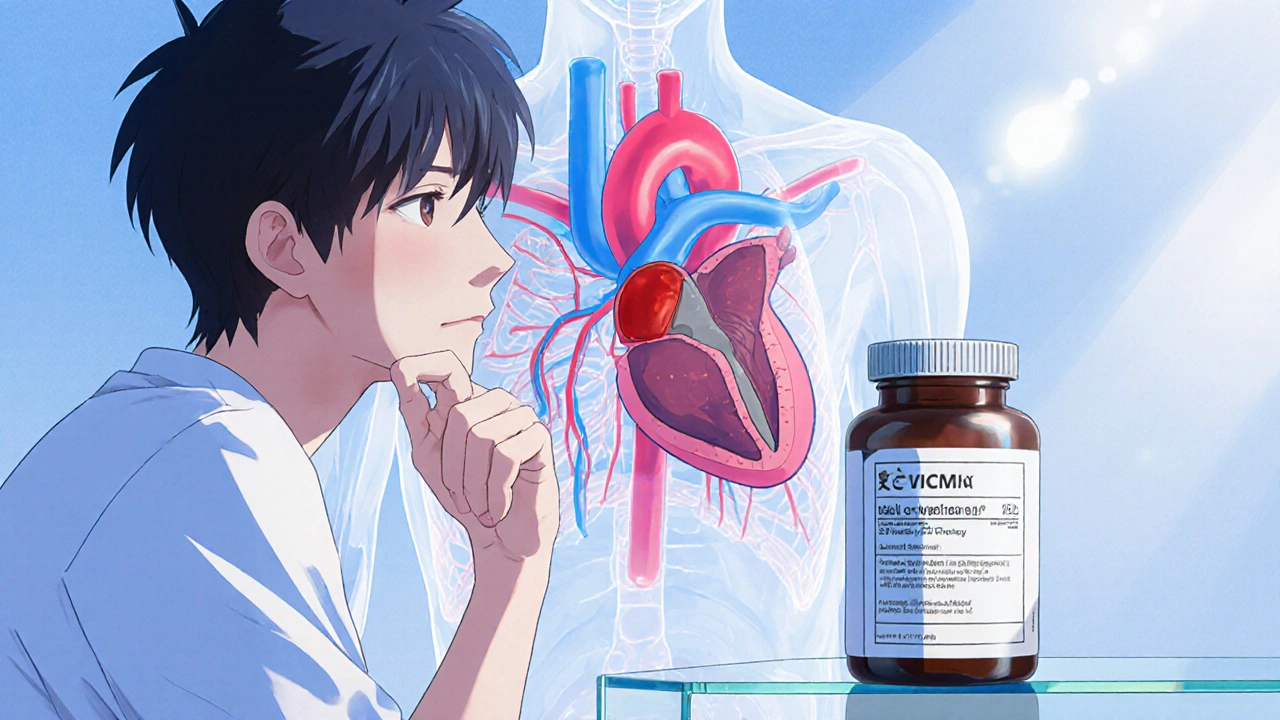Ischemia Supplement Dosage Calculator
Personalized Recommendations
Recommended Supplements
Important Safety Information
Imagine dealing with reduced blood flow to vital tissues and wondering if a bottle on your shelf could help. That’s the question many face when they hear about ischemia supplements. While medication remains central, a growing body of research shows certain nutrients can support blood vessel health, reduce oxidative stress, and even improve symptoms. This guide walks you through what’s real, what’s hype, and how to use supplements safely if you or a loved one are coping with ischemia.
What Is Ischemia?
When blood can’t reach an organ or tissue in sufficient quantity, that lack of oxygen and nutrients is called Ischemia a medical condition where reduced blood flow leads to tissue damage or dysfunction. It can affect the heart (myocardial ischemia), brain (cerebral ischemia), limbs (peripheral ischemia), or any organ. The root causes often involve narrowed arteries, blood clots, or systemic low blood pressure.
Why Nutrition Should Join the Conversation
Blood vessels aren’t just passive pipes; they’re living tissue that reacts to diet, inflammation, and oxidative stress. Certain nutrients act like maintenance crews - they improve endothelial function, reduce inflammation, and protect cells from free‑radical damage. When you add the right supplements to a balanced diet, you may give your circulatory system a modest boost while you await or complement medical therapies.
Key Supplements Backed by Research
Not all pills are created equal. Below are the nutrients with the strongest evidence for helping ischemic conditions.
-
Vitamin D a fat‑soluble vitamin that modulates immune response and supports endothelial health. Low levels are linked to higher cardiovascular risk. Typical supplementation: 1,000-2,000 IU daily, aiming for serum 25‑OH levels above 30 ng/mL. Watch for hypercalcemia if you exceed 4,000 IU regularly.
-
Omega‑3 Fatty Acids essential polyunsaturated fats found in fish oil that lower triglycerides and reduce inflammation. DHA and EPA together (≈1,000 mg) have shown modest improvements in arterial elasticity and reduced clot formation. High doses (>3 g) may increase bleeding risk.
-
Coenzyme Q10 a mitochondrial antioxidant that aids cellular energy production. Particularly useful for patients on statins, which can lower natural CoQ10 levels. Standard dose: 100-200 mg daily, taken with meals to enhance absorption.
-
L‑Arginine an amino acid that serves as a precursor for nitric oxide, a vasodilator. Doses of 2-6 g split across the day may improve flow in peripheral artery disease, but results are mixed for coronary ischemia. Not recommended for individuals with a history of herpes virus reactivation.
-
Magnesium a mineral involved in muscle relaxation and vascular tone regulation. Adequate intake (300-400 mg elemental magnesium) can prevent vasospasm and support heart rhythm stability. Beware of diarrhea with high‑dose magnesium oxide.
How These Supplements Stack Up
| Supplement | Primary Benefit | Typical Dose | Evidence Level | Key Safety Note |
|---|---|---|---|---|
| Vitamin D | Endothelial support | 1,000-2,000 IU/day | Moderate (RCTs) | Monitor calcium |
| Omega‑3 (EPA/DHA) | Anti‑inflammatory, anti‑thrombotic | 1,000 mg EPA+DHA | Strong (meta‑analysis) | Bleeding risk at >3 g |
| CoQ10 | Mitochondrial protection | 100-200 mg | Moderate (RCTs) | Rare GI upset |
| L‑Arginine | Vasodilation via NO | 2-6 g | Low‑to‑moderate | Avoid if herpes prone |
| Magnesium | Vascular tone, rhythm | 300-400 mg elemental | Moderate | Diarrhea at high doses |
Choosing the Right Supplement Regimen
Before you pop a new capsule, ask yourself a few practical questions:
- What specific type of ischemia am I dealing with? Cardiac, cerebral, or peripheral?
- Am I already on prescription drugs like anticoagulants, statins, or antihypertensives?
- Do I have any documented deficiencies (e.g., low vitamin D) that need correction first?
- Can I afford a quality product that has third‑party testing?
Answering these helps you prioritize. For instance, a patient on a high‑dose statin may benefit most from CoQ10, whereas someone with peripheral artery disease might see the biggest gain from Omega‑3s and L‑Arginine.

Common Pitfalls & Red Flags
It’s easy to get carried away by bold marketing claims. Here’s what to watch out for:
- “Cure‑all” promises: No single supplement will fix ischemia. Look for adjunctive support, not a miracle.
- Excessive dosages: Higher isn’t always better. Over‑supplementing can cause toxicity or interfere with medications.
- Unverified brands: Choose products that display USP, NSF, or Informed‑Sport certification.
- Self‑diagnosis: If you suspect ischemia, get a proper medical evaluation before starting any regimen.
Practical Checklist for Safe Supplement Use
- Get a baseline blood test for vitamin D, magnesium, and lipid panel.
- Discuss any new supplement with your primary care physician or cardiologist.
- Start with the lowest effective dose and monitor symptoms.
- Track any side effects in a simple journal - note timing, dosage, and what you felt.
- Re‑evaluate every 3-6 months with your doctor; adjust or discontinue as needed.
Frequently Asked Questions
Can supplements replace prescription medication for ischemia?
No. Supplements are meant to complement, not replace, prescribed therapies. Stopping medication without a doctor’s guidance can be dangerous.
How long does it take to see benefits from these supplements?
Most studies report measurable changes after 8-12 weeks of consistent dosing, though individual responses vary.
Are there any interactions with blood thinners?
Yes. High‑dose omega‑3s and vitamin E can increase bleeding risk when combined with warfarin or clopidogrel. Always check with your doctor.
Is there a preferred form of magnesium for vascular health?
Magnesium citrate or glycinate are better absorbed and tend to cause fewer digestive issues than magnesium oxide.
Do I need to take all these supplements together?
Not necessarily. Tailor the regimen to your specific condition, lab results, and doctor’s advice. Sometimes a single well‑chosen supplement offers the most benefit.
Supplements can be a useful piece of the puzzle when tackling ischemia, but they work best alongside medical supervision, a balanced diet, and regular exercise. By staying informed and choosing quality products, you give your circulatory system the best chance to heal and thrive.


Comments
Sameer Khan
When considering adjunctive therapy for ischemic pathology, it is imperative to adopt a mechanistic perspective that integrates endothelial function, oxidative stress modulation, and myocardial energetics. Vitamin D, for instance, exerts pleiotropic effects on the renin-angiotensin system, thereby influencing vascular tone and inflammatory cascades. Moreover, serum 25‑OH concentrations above the threshold of 30 ng/mL have been correlated with improved flow‑mediated dilation in cohort studies. Omega‑3 polyunsaturated fatty acids, primarily EPA and DHA, incorporate into phospholipid membranes, attenuating arachidonic acid–derived eicosanoid synthesis and thus reducing platelet aggregation propensity. The meta‑analysis by Calder et al. underscores a relative risk reduction of 12 % for major cardiovascular events with daily intake approximating 1 g of combined EPA/DHA.
Coenzyme Q10 functions as an electron carrier within the mitochondrial respiratory chain, and its supplementation can replenish depleted reserves, especially in patients receiving HMG‑CoA reductase inhibitors. Randomized trials have demonstrated a modest increase in left ventricular ejection fraction when 100–200 mg of ubiquinol is administered over a 12‑week period. L‑Arginine, as a substrate for nitric oxide synthase, may augment vasodilatory capacity, yet heterogeneity in study outcomes mandates patient‑specific risk assessment, particularly regarding herpesvirus reactivation.
Magnesium’s role as a calcium antagonist further contributes to vascular smooth muscle relaxation, and clinical observations reveal a decrement in arrhythmic incidents when elemental intake meets the 300–400 mg daily target. Nevertheless, supratherapeutic dosing of magnesium oxide frequently precipitates osmotic diarrhea, necessitating formulation selection such as citrate or glycinate for enhanced bioavailability.
From a pharmacokinetic standpoint, the temporal onset of hemodynamic improvement typically manifests after 8–12 weeks of consistent supplementation, aligning with the half‑life of the respective nutrients and the time required for tissue incorporation. Interactions with anticoagulants merit vigilance; for example, high‑dose omega‑3s may potentiate warfarin’s anticoagulant effect, increasing the international normalized ratio (INR) beyond therapeutic range.
In synthesis, a stratified approach-prioritizing vitamin D repletion in deficient individuals, omega‑3 supplementation for anti‑inflammatory benefit, co‑Q10 for statin‑induced depletion, and magnesium for rhythm stability-optimizes adjunctive support while minimizing adverse events. Continuous monitoring of serum biomarkers and periodic reassessment with a cardiology specialist ensure that the supplement regimen remains congruent with evolving clinical status.
On October 22, 2025 AT 20:14
Vin Alls
Yo, if you’re looking to give your blood vessels a little boost, think of these supplements as the colorful paint on a rusted fence. Omega‑3s are the slick oil that keeps the hinges moving, while CoQ10 is like a tiny battery that keeps every cell humming. Vitamin D? That’s the sunshine in a capsule – it tells your endothelium to chill out on the inflammation front. And let’s not forget magnesium, the unsung hero that keeps your heart rhythm from doing the jitterbug. Just remember, you’re not swapping your meds for a magic potion; you’re adding a side‑kick to the main act.
On November 3, 2025 AT 22:21
Harini Prakash
Great points, Vin! 😊 I’d add that consistency is key – you won’t see big changes overnight, but staying on track with a balanced diet and these supplements can really pay off over a few months. Also, choosing third‑party tested brands can save you from low‑quality fillers. Keep that positive vibe going!
On November 16, 2025 AT 01:27
Emily Collins
This stuff feels like a gamble.
On November 28, 2025 AT 04:34
Tammy Sinz
When interpreting the clinical relevance of adjunctive nutraceuticals, one must assess both the therapeutic index and the pharmacodynamic synergy with existing pharmacotherapy. For patients on antiplatelet agents, high‑dose omega‑3s may exacerbate bleeding tendencies, whereas co‑Q10 can mitigate statin‑induced mitochondrial dysfunction without known adverse interactions. Therefore, a tailored regimen, guided by laboratory markers and patient comorbidities, is essential for optimal outcomes.
On December 10, 2025 AT 07:41
Christa Wilson
Love the thoroughness, Tammy! 🌟 Adding a dash of optimism never hurts – think of these supplements as little allies cheering on your heart and vessels. Keep it up! 👍
On December 22, 2025 AT 10:47
John Connolly
Alright folks, let’s remember that supplements are just one piece of the puzzle. Pair them with regular exercise, a heart‑healthy diet, and those routine check‑ups, and you’ll be stacking the odds in your favor. Stay motivated, stay consistent, and your circulatory system will thank you!
On January 3, 2026 AT 13:54
Emma Parker
hey john i think u r missing the point here u cant just pop pills and expect miracles lol but yeah keep the vibes good
On January 15, 2026 AT 17:01
Bret Toadabush
People don’t realize the pharma giants are peddling these “supplements” to keep us dependent while they hide the real cure. If you’re not skeptical, you’re being played.
On January 27, 2026 AT 20:07